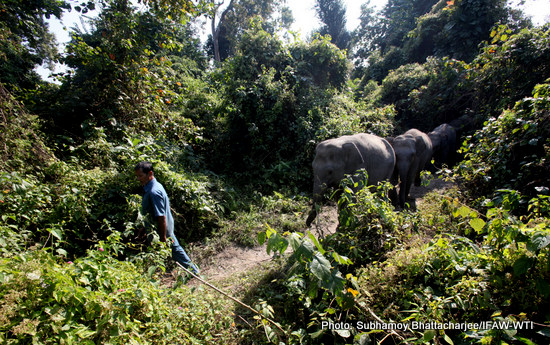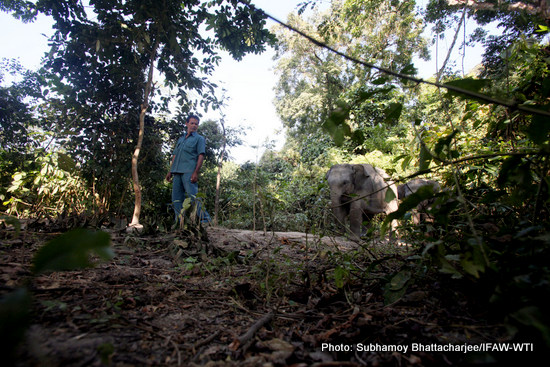Baby Elephants Walk in the Wild
CWRC, Kaziranga: A long process of rehabilitation for rescued, displaced, orphaned elephant calves is underway at the IFAW-WTI run Centre for Wildlife Rehabilitation and Conservation (CWRC) at Kaziranga of which seven calves are now venturing out on forest walks with their ‘foster mother’, the animal keeper.
The goal of CWRC is to put back all rescued wildlife back to the wild after following set rehabilitation protocols. The seven elephant calves are at a stage when they set out to explore the wilderness in Panbari Reserve Forest under the watchful eyes of their keeper to help them get acquainted with the wilderness and prepare them for an independent life in the wild.
While at CWRC, they are bottle fed with special formula and nutritional supplements in groups with other calves. Elephants, being social by nature, move as herd and live in the forest. The calves are therefore bottle fed with other calves and are free to bond with their ilk at playtime that will later keep them in a herd.
Following the protocol of elephant calf hand raising and rehabilitation, the IFAW-WTI animal keepers who are also the acting ‘foster mothers’ take them on walks initially to experience the forest and later, learn to fend for themselves and be independent.
Ramen Das, animal keeper of CWRC who is taking them for the wild walk said, “This is just a beginning for this batch of seven. They are exploring different leaves and fruits, especially elephant apple (Dillenia indica) these days.” These short walks pave the way for longer duration forays in the forest and after a few months, the calves are weaned off formula when they start foraging on their own in the forest.
While learning the survival skill in the forest through wild walks, they sometime encounter wild elephant herds too and it was noticed that they follow the tracks made by the wild herd and explore the same.
According to Dr. Panjit Basumatary, IFAW-WTI veterinarian at CWRC, “From the neo-natal age during hand raising the elephant calves are dependent upon milk formula. Gradually it has been reduced to make them seek forest food, which is their instinctive nature. Taking them on such walks will help them learn the survival skills in the forest.”
As they are being introduced to the forest by the foster mothers and exploring the wilderness to search natural food, one day they will be fully dependent on forest food and start living in the wild at the release site, which is a process of the elephant rehabilitation program of IFAW-WTI.
Till date eight elephant calves have been successfully rehabilitated back in the wild.











